New International Dictionary of New Testament Theology and Exegesis, 2nd Edition | NIDNTTE (5 vols.)
Digital Logos Edition
Overview
Discover powerful insights into New Testament Greek with this revised edition of Colin Brown’s classic reference work. The New International Dictionary of New Testament Theology and Exegesis provides pastors, students, and scholars with the background and usage of Greek words in the New Testament—as well as related usage in the Septuagint, Jewish literature, and more. Expanded to include words and concepts not discussed in the original work, the second edition contains nearly 800 entries covering over 3,000 Greek words.
Quickly find the information you need with the new alphabetical arrangement. Look up an English word in the “semantic domain index” and find a listing of Greek words related to that topic. Expand your study with resources listed in the updated bibliography. The entries in this edition have been revised to include insights from modern scholarship and correct inconsistencies and omissions in the original. The New International Dictionary of New Testament Theology and Exegesis is the authoritative version of an essential Greek resource.
Be sure to check out the companion New International Dictionary of Old Testament Theology and Exegesis (NIDOTTE) and the Theological Dictionary of the New Testament (TDNT).
This title is included in the following collections
You can save when you purchase this product as part of a collection.
New International Dictionary o...
$358.99$358.99Zondervan Reference Collection...
$1,039.77$829.99Zondervan Biblical Greek Langu...
$864.99$864.99Zondervan Biblical Languages C...
$999.99$999.99
- $1,433.59$1,145.99
- $4,336.55$3,468.99
- $21,970.44$16,474.99

- Provides background and usage of Greek words in the New Testament, Septuagint, Jewish literature, and more
- Arranges entries in alphabetical order, improving the layout of the original
- Includes words and concepts not covered in the original work
- Contains updated entries, bibliographies, and indexes
- Offers a semantic range index for looking up English words
Top Highlights
“The vb. στρατεύω is used also of the spiritual struggles of the Christian. James points out to his readers that the quarrels taking place in their community arise from the desires that ‘battle’ within them (Jas 4:1). Peter urges Christians to resist the sinful desires that ‘wage war’ against their souls (1 Pet 2:11). This conflict in the life of the believer is dealt with most fully by Paul in Rom 7:7–25, and near the end of his discussion he states: ‘For in my inner being I delight in God’s law; but I see another law at work in me, waging war against the law of my mind [ἀντιστρατευόμενον τῷ νόμῳ τοῦ νοός μου] and making me a prisoner of the law of sin at work within me’ (7:22–23). See νοῦς G3808 NT 1 (a).” (Volume 4, Page 385)
“In the Pauline writings the word group evidently denotes any kind of illegitimate sexual activity (except for πόρνη, which means specifically ‘prostitute’).” (Volume 4, Page 115)
“The rhetorical question of Jer 23:24, ‘Do not I fill [πληρῶ] heaven and earth?’ is meant to emphasize that no one can hide from God.” (Volume 3, Page 786)
“The vast majority of usages are metaph., with the heart viewed as the very center of human life.” (Volume 2, Page 624)
“The word group conveys the idea of thinking differently, and if the change of mind involves the recognition that the previous opinion was false or bad, we get the sense of feeling remorse or regret. In ancient Gk. culture, however, the thought of a radical change in a person’s life as a whole does not seem to play an important role. Thus the Christian concept of conversion is not derived from Gk. thought, and its origin must be sought elsewhere.” (Volume 3, Page 290)
. . . This New International Dictionary of New Testament Theology and Exegesis brings the tools that pastors need all together in one set! What the brilliant Moises Silva and team have put together is a exegetical tour-de force. It will be my go-to workhorse for years to come. I can’t imagine the amount of time I’m going to save now that these resources are all in one place!
—Dr. Rick Warren, senior pastor, Saddleback Church
- Title: New International Dictionary of New Testament Theology and Exegesis
- Editor: Moisés Silva
- Publisher: Zondervan
- Volumes: 5
- Pages: 3,552
- Christian Group: Evangelical
- Resource Type: Reference
- Topic: Language & Interpretation
- New International Dictionary of New Testament Theology and Exegesis Volume 1:
Α–Δ - New International Dictionary of New Testament Theology and Exegesis Volume 2:
Ε–Κ - New International Dictionary of New Testament Theology and Exegesis Volume 3:
Λ–Πν - New International Dictionary of New Testament Theology and Exegesis Volume 4:
Πο–Ω - New International Dictionary of New Testament Theology and Exegesis Volume 5: Index Volume
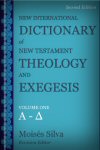
This volume, covering entries beginning with
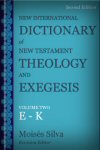
This volume includes entries from
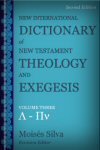
Explore entries on words beginning with
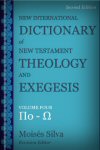
The entries in this volume, ranging from
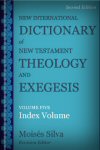
The final volume in the New International Dictionary of New Testament Theology and Exegesis provides the tools you need to fully utilize the other volumes. Consult the Old Testament, New Testament, and Apocrypha indexes when studying a particular passage. Discover usage in extra-biblical literature with the Greek, Jewish, and subsequent Christian literature indexes. Look up a word in its original language with the Greek and Hebrew/Aramaic indexes. Convert concordance numbers with the Strong’s to Goodrick-Kohlenberger Number Conversion chart. This is an essential volume for making the most of your New International Dictionary of New Testament Theology and Exegesis.
Reviews
40 ratings
Cristian Cirloaba
3/20/2025
Alan Arthur
9/16/2024
Young Gun Park
6/29/2024
Andrew stichweh
6/28/2023

Shane Lems
12/28/2021
Yen Ter
4/5/2021

Brayden Brookshier
6/25/2020
Worth every penny. Each article is just the right length and amount of expositional research. And it is perfect for Logos's features like highlighting active lemmas or verses, etc. I am very thankful for this resource!
Sergio Castrillon
9/26/2019
This is a must-have in the student and pastor library. It worths every penny. I'm not sure if it includes all Greek words in the NT, but it is a perfect complement to BDAG.
Ben Clark
8/2/2019